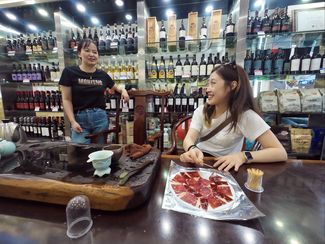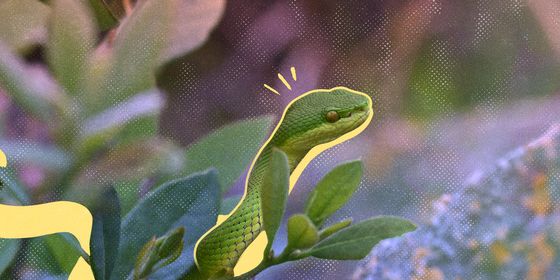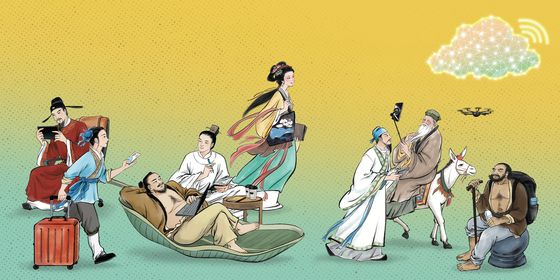Discover popular sayings about youth through these Chinese idioms and proverbs to use when (mostly) praising the younger generation.
Over 120 years ago, after the failed One Hundred Days Reforms of the ailing Qing dynasty, scholar Liang Qichao wrote his famous essay “Young China,” introducing several sayings about youth that are still widely quoted today: “The responsibility bestowed by history falls on nobody but us youths. If we are intelligent, China will be intelligent. If we are wealthy, China will be wealthy. If we are strong, China will be strong. If we are independent, China will be independent.”
Ever since then, Chinese intellectuals and media have often touted the idea that the destiny of the nation is intertwined with its young people. Today’s netizens have invented many creative terms for the young, from “little fresh meat (小鲜肉)” for baby-faced celebrities to “rear waves (后浪)” for intrepid young change-makers. Ancient Chinese, too, had many chengyu that refer to the dynamism and daring (as well as ignorance) of youth.
初生牛犊不怕虎 Chūshēng niúdú bú pà hǔ
A newborn calf is not afraid of tigers
It’s said in English “courage is the fairest adornment of youth.” Young people are believed to be fearless, though this is partly because they are ignorant and inexperienced. The philosopher Zhuangzi contributed a wonderful metaphor to describe the boldness of youth: "—初生牛犊不怕虎 (Yī chūshēng niúdú bú pà hǔ, A newborn calf is not afraid of tigers)," which then evolved into a chengyu. It’s often used to praise young people for their fearlessness.
A newborn calf is not afraid of tigers. I didn’t expect this young man to dare to take on such a tough task.
Zhēn shì chūshēng niúdú bú pà hǔ. Méi xiǎngdào zhè wèi niánqīngrén jūrán gǎn chéngdān qǐ rúcǐ zhòngrèn.
真是初生牛犊不怕虎。没想到这位年轻人居然敢承担起如此重任。
后生可畏 Hòushēng-kěwèi
The young are to be regarded with awe
Confucius was also aware of the strength and potential of the young. According to the Analects, the sage once lamented that: “The young are to be regarded with awe. How do we we know that the younger generation won’t surpass the older? (后生可畏,焉知来者之不如今也?Hòushēng-kěwèi, yān zhī láizhě zhī búrú jīn ye?)”
There is a legend associated with this quote. One day, Confucius encountered a child in the street, who was sitting inside a beautiful sand castle he had built. Confucius stopped his carriage and asked why the child didn’t make way to let the carriage pass. The kid answered: “I only know of carriages bypassing a castle, but I've never heard a castle making way for a carriage.” Surprised by the answer, the philosopher exclaimed, “You know so much for your age!” The precocious child then replied: “I've heard that fish can swim three days after birth, hares can run three days after birth, and horses can walk behind their mother three days after birth. This is all natural. What does it have to do with age?”
Confucius was amazed at the child’s logical mind and eloquence, and declared that young people had infinite potential. Today, this chengyu is often used by older people to compliment a young person’s outstanding ability.
He has achieved so much at such a young age. Young people are certainly to be regarded with awe.
Tā niánji qīngqīng, jiù qǔdé rúcǐ chéngjiù, zhēnde shì hōushēng-kěwèi a.
他年纪轻轻,就取得如此成就,真的是后生可畏啊。
风华正茂 Fēnghuá-zhèngmào
To be at the height of one’s youth
Chairman Mao Zedong also valued young people. In a speech in 1957, he compared young people to “the sun at eight or nine o’clock in the morning”, a slogan which gained popularity during the Cultural Revolution. “The world is yours, as well as ours. But ultimately, it’s yours,” Mao continued.
But Mao's most popular description of the young comes from his poem “Memory of Changsha City”, which goes:
Young we were, schoolmates,
At life's full flowering;
Filled with student enthusiasm
Boldly we cast all restraints aside.
Pointing to our mountains and rivers,
Setting people afire with our words,
We counted the mighty no more than muck.
Qià tóngxué shàonián,
fēnghuá-zhèngmào,
shūshēng yìqì,
huīchì fāng qiú.
Zhǐdiǎn jiāngshān,
jīyáng wénzì,
fèntǔ dāngnián wànhùhóu.
恰同学少年,
风华正茂,
书生意气,
挥斥方遒。
指点江山,
激扬文字,
粪土当年万户侯。
The poem was so widely known that the second line, 风华正茂 (fēnghuá-zhèngmào, At life’s full flowering) became a chengyu, meaning “to be in the prime of one's life.”
He was in his 20s, just in the prime of life, but died in an accident.
Tā cái èrshí duō suì, fēnghuá-zhèngmào, què zài yì chǎng shìgù zhōng qùshì le.
他才二十多岁,风华正茂,却在一场事故中去世了。
乳臭未干 Rǔxiù-wèigān
Still smelling of one’s mother’s milk
But not everyone respects the young. During the Chu-Han Contention (an interregnum between the Qin and Han dynasties of China), Liu Bang (刘邦), later the founder of the Han dynasty, once sent an envoy named Li Yiji (郦食其) to persuade Wei Bao (魏豹), the ruler of the Kingdom of Western Wei, to surrender. Wei refused, and Liu decided to send his forces to attack. Li then reported to Liu what he had learned in Wei, saying that their commanding general was Bai Zhi (柏直). Hearing that, Liu was relieved, because he felt that Bai was too young to be a threat. He said: “There is still the smell of his mother’s milk in his mouth. He cannot compare with my general Han Xin (韩信).”
Liu’s judgment was right. Bai was defeated by Han in the battle, and even Wei was captured. Later, people used the chengyu 乳臭未干 (rǔxiù-wèigān, Still smelling of one’s mother’s milk) to describe the young and inexperienced. It’s a term with obvious derogatory meanings.
He is just a kid still smelling of his mother's milk, how capable did you expect him to be?
Tā jiù shì yí gè rǔxiù-wèigān de xiǎozi, nǐ zhǐwàng tā yǒu duō dà néngnai?
他就是一个乳臭未干的小子,你指望他有多大能耐?












